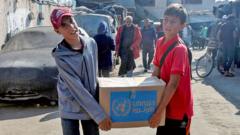
US Maintains Military Aid to Israel Despite Gaza Humanitarian Concerns
The United States has declared that Israel has not breached American laws regarding humanitarian aid access in Gaza, despite a 30-day deadline set by Secretary of State Antony Blinken to increase aid supplies. The deadline expired on Tuesday, with US officials acknowledging some progress while emphasizing the need for further improvements.
State Department spokesman Vedant Patel highlighted the opening of a new land crossing and resumed deliveries in northern Gaza. However, the United Nations paints a starkly different picture, warning that aid levels are at their lowest point in a year.
UN officials have raised grave concerns about the humanitarian situation. Joyce Msuya, the UN’s acting under secretary general for humanitarian affairs, reported that international crimes are being committed in Gaza. She emphasized that 75,000 people remain in North Gaza with critically dwindling supplies, and there is an imminent risk of famine.
The original letter from the US demanded an end to the isolation of northern Gaza, where aid groups warn of civilians being starved during Israel’s military offensive. Humanitarian agencies have reported that conditions have actually worsened since the letter was sent.
Despite these warnings, the US appears poised to continue supplying weapons to Israel. The Israeli military maintains that it is combating a Hamas resurgence in the region and claims to have substantially increased aid deliveries. They also accuse aid agencies of inadequate distribution.
The conflict’s origins trace back to Hamas’s attack on southern Israel on October 7, 2023, which killed approximately 1,200 people and resulted in 251 hostages. In response, Israel launched a campaign to destroy Hamas, which has since resulted in over 43,000 deaths in Gaza, according to the territory’s Hamas-run health ministry.
UN human rights officials have raised serious concerns about the nature of the military campaign. Ilze Kehris, the UN’s assistant secretary general for human rights, suggested that the pattern and frequency of Israel’s attacks indicate systematic targeting of civilians.
Specific incidents highlight the humanitarian crisis. In Beit Hanoun, for instance, food and water reached shelters on Monday, only for Israeli soldiers to forcibly displace people from those areas the following day.
The majority of the death and destruction has been caused by US-supplied weapons, given to Israel to help fight Hamas. Despite growing international criticism and warnings from humanitarian organizations about civilian casualties and displacement, the US appears committed to maintaining its military support for Israel.
As the conflict continues, the humanitarian situation remains dire, with aid agencies and UN officials calling for increased access to Gaza and protection of civilian populations.









